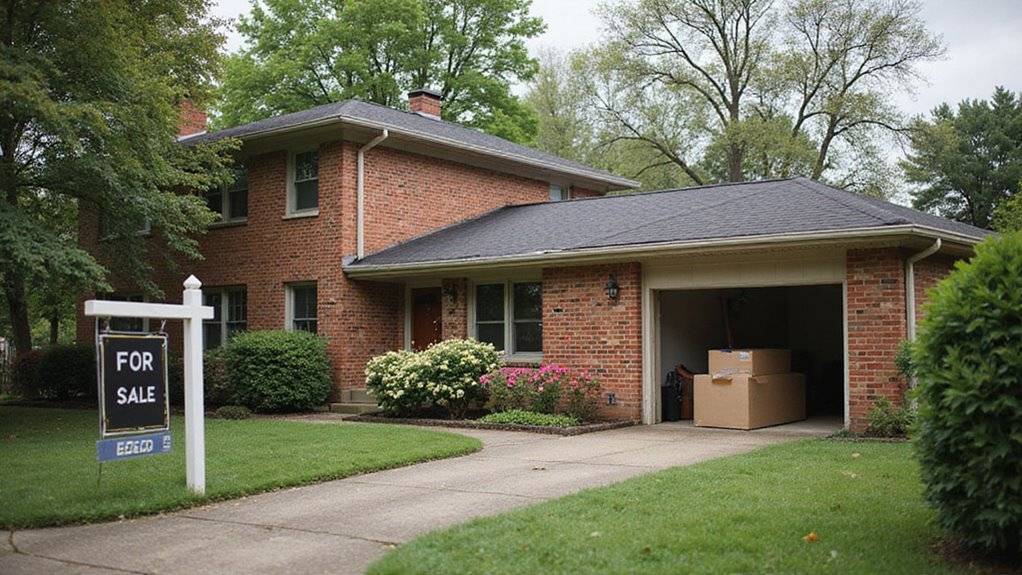Divorce in Virginia often brings tough choices, especially about your marital home. Selling it can feel overwhelming and confusing. The process involves legal rules and emotional stress. How do you navigate this tricky situation without losing your peace of mind? The stakes are high when selling a house after divorce.

Financial burdens, legal disputes, and emotional strain can pile up fast. You might worry about getting a fair deal or splitting proceeds. These challenges can make the process feel like an uphill battle. But there’s a way to handle this smoothly with the right guidance.
Selling a house after divorce in Virginia is manageable with smart strategies. By understanding your options like buyouts or sales, you can make informed choices. This approach helps reduce stress and secure your future. This blog will guide you through selling your house post-divorce in Virginia, offering clear solutions and support.
Key Takeaways
- Understand Virginia’s equitable distribution laws for fair, not equal, division of marital property during divorce.
- Classify the house as marital or separate property to determine division rights.
- Hire an attorney to navigate legal requirements and protect your interests.
- Consider buyout, forced sale, or co-ownership options for managing the home.
- Act quickly, following market trends, to maximize sale chances in Virginia.
Understanding Property Division in Virginia Divorces

Virginia uses an equitable distribution system for property division. This means courts split marital property and debts fairly. Fair division does not always mean equal shares. Marital property includes assets and debts gained during marriage. If you have separate property, it usually stays yours. Separate property covers items owned before marriage or received as gifts.
Take a clear inventory of all assets and debts. Courts look at marriage length and each spouse’s contributions. They also consider financial needs when deciding splits. If you hide anything, it can harm your case. Always disclose everything for a fair outcome. Use this information to safeguard your rights in court. For those facing challenges with property division, consider exploring cash home sales for a quick and stress-free solution to selling your house.
How to Navigate House Sales During Divorce
When handling house sales during a divorce in Virginia, you must first understand the legal requirements for property division, ensuring compliance with court orders and agreements. Determine your home ownership rights alongside your ex-spouse to clarify who holds authority over the sale. Keep timeline considerations in mind, as delays can complicate the process and impact your financial outcomes. Opting for a cash sale can expedite the process with guaranteed all-cash offers, avoiding delays tied to traditional financing.
Legal Requirements for Property Division
Handling property division in a Virginia divorce is tricky, but knowing the basics helps. Virginia uses equitable distribution, so assets aren’t split evenly. Instead, they are divided based on fairness. Your house must be classified as marital or separate. This classification decides how it’s split.
Other financial matters include Pension Division and Debt Allocation. You should know who gets retirement benefits if applicable. Also, clarify who handles shared debts after divorce. If you’re unsure, hire a skilled attorney for guidance. They ensure you follow Virginia’s strict laws and protect your rights.
Court Orders and Agreements
Handling court orders in a Virginia divorce is crucial when selling a house. You must review property division orders carefully. These often decide how sale proceeds are shared between spouses. If child custody is involved, ensure the sale respects living arrangements. Alimony terms might also affect the financial split or sale timing.
Don’t ignore court deadlines or specific rules tied to the process. Work with your attorney to understand all agreements clearly. If you stay proactive, you can avoid legal issues. Being informed helps you manage this complex situation confidently.
Determining Home Ownership Rights
To find out who owns the house in a Virginia divorce, check the deed first. If your name is on it, you likely have a strong claim. However, Virginia’s laws focus on fair division, not just titles. Courts can split property based on what’s equitable.
Consider rare cases like Adverse Possession, where someone claims rights after long use. Also, think about Superior Domain, where the government might take the home. If this happens, ownership gets more complex. Always consult a skilled attorney for clarity.
Don’t assume ownership is simple and clear. Dig into legal details to protect your rights. A lawyer can guide you through this process. Ensure you understand all factors before deciding.
Timeline Considerations
Timing is crucial when selling a house during a divorce in Virginia. You must align the sale with legal steps. If delays happen, they can create stress and complications. Set clear deadlines with your attorney and agent. This helps keep everything on track.
Family changes also bring emotional and practical hurdles. You are not just selling a home, but moving on. If deadlines are tight, make quick decisions. Work with experts like Align Real Estate Solutions for support. They can manage paperwork and ensure a smooth, fair sale.
What Are Your Options for the Marital Home?

When deciding what to do with your marital home after a divorce in Virginia, you’ve got several clear paths to consider. You can consider a buyout where one spouse purchases the other’s share, opt for a forced sale if agreement falters, continue co-ownership under specific terms, or look into refinancing to shift ownership. Additionally, if you’re facing urgent financial needs or emotional stress, a swift cash offer from a trusted buyer can provide a quick resolution without the hassle of traditional sales. Let’s break down these options to find the best fit for your situation.
Buyout Options
Divorce in Virginia often involves deciding on the marital home. If you want to keep it, consider a buyout. You can use Buyout Financing to get a loan for your ex-spouse’s share. Another choice is Equity Sharing, splitting ownership while one lives there. If you have cash, a direct buyout works too. Each option needs careful thought about your finances. Make sure it fits your future plans and current funds.
Forced Sale Scenarios
If a court orders a forced sale, it means dividing the marital home during a Virginia divorce. When you and your spouse disagree, the court may require selling the property. This ensures an equitable split of the asset’s value. Knowing the process helps you prepare for what happens next.
One option is a public sale through Auction Bidding. Here, the highest bidder wins the property. This method aims to secure a fair market price. Stay updated, as the sale is usually final.
You might have Redemption Rights in some cases. These rights could let you reclaim the home before the sale ends. If you think this applies, consult a lawyer quickly. Acting fast is crucial to protect your interests.
Though a forced sale feels tough, understanding your choices helps. If you stay informed, navigating this situation becomes easier.
Continued Co-ownership
Continued co-ownership can work after a divorce in Virginia if you and your ex-spouse cooperate well. Both of you will keep ownership and share duties like property maintenance. This includes splitting costs for repairs, taxes, and mortgage payments.
Be aware of shared liability risks in this setup. If one person skips their payment, creditors might target both. You could face financial stress because of this issue. Always create clear, written agreements to safeguard your interests. If trust or communication lacks, conflicts may arise easily. Consider other options for the marital home if co-ownership seems tough.
Refinancing Possibilities
After a divorce in Virginia, refinancing your marital home offers solutions for ownership. If you wish to keep it, refinancing can remove your ex-spouse’s name. This secures your sole ownership easily. Equity refinancing lets you access home value for a buyout. Rate adjustments might lower your payments if rates drop.
Here are some options to explore:
- Equity Refinancing: Use home value to pay off your ex.
- Rate Adjustments: Secure a lower rate for cheaper payments.
- Solo Mortgage: Refinance alone to end joint responsibility.
- Lender Consultation: Talk to experts for personalized advice.
Make a smart choice for your financial stability.
Common Challenges in Divorce Property Sales
When selling a house after divorce in Virginia, you’ll likely face hurdles like emotional attachment to the property, which can cloud your judgment. Price disagreements with your ex-spouse, along with timing issues, often complicate the process and delay a sale. On top of that, sorting out mortgage responsibilities can create additional stress if you’re not aligned on who handles what. Additionally, navigating these challenges can be streamlined with fair cash offers that eliminate the need for lengthy negotiations or repairs.
Emotional Attachment
Heartache often strikes when selling a house during divorce due to strong emotional ties. You’re not just parting with a building; you’re releasing memories and past dreams. If you ignore these feelings, healing might slow down. Acknowledging them is vital for moving on.
Here’s how to handle this challenge:
- Reflect on the Past – Write what the home meant to you for relief.
- Get Help – Talk to friends or a counselor for support.
- Look Ahead – Imagine a new beginning in a different place.
- Sort Keepsakes – If items matter, keep them; otherwise, let go.
Price Disagreements
How do you settle on a price during a divorce when emotions are high? Price disputes can delay selling your Virginia home. A detailed Market Analysis helps find a realistic value using current trends. This approach reduces emotional bias in negotiations. If agreement remains elusive, try Dispute Resolution like mediation. A neutral person can guide you to a fair deal. By relying on facts, you can avoid long conflicts. Structured solutions help sell your house quickly, even in tough times.
Timing Issues
Timing often creates problems when selling a house during a divorce in Virginia. Emotional stress and legal issues complicate matters. The real estate market moves fast and waits for no one. If you sell outside spring or early summer, fewer buyers may show interest. Economic downturns can also lower demand and delay sales.
Here are some timing challenges you might encounter:
- Court Delays: Divorce cases can slow down your plans to list the house.
- Seasonal Drops: If you miss peak season, buyer interest could drop significantly.
- Market Changes: Economic shifts might cause prices to fall suddenly.
- Personal Disagreement: You and your spouse may not decide on a selling time.
Act quickly and follow market trends to boost your sale chances in Virginia.
Mortgage Responsibilities
Managing mortgage responsibilities during a divorce in Virginia is often tricky. Couples must decide who handles the payments. If selling the home, they should split any remaining debt fairly. Checking the Amortization Table helps understand the loan balance. It also shows the interest breakdown for clarity. Reviewing Escrow Accounts is important for taxes and insurance. These funds need proper division or sale accounting.
If agreement on payments fails, refinancing might be necessary. One spouse could remove the other from the loan. Misunderstandings can create problems, so seek expert help. Consulting a legal or financial advisor protects your interests. With careful planning, you can overcome this challenge. This ensures confidence after the divorce.
Legal Process of Selling During Divorce

When selling a house during a divorce in Virginia, you must navigate specific legal steps to ensure compliance and fairness. You’ll need court approval, proper documentation, and a clear plan for dividing proceeds, while also considering tax implications that could affect your financial outcome. Trust experts like Align Real Estate Solutions to guide you through this process with precision and ease. For those facing unique challenges, we offer flexible timeline options to accommodate your specific needs during this difficult time.
Court Approval Requirements
Selling a house during a divorce in Virginia needs court approval. The property is often a marital asset. You must follow legal steps to avoid issues or delays.
Here’s what you need during court approval:
- Motion Filing: You file a request to show your plan to sell.
- Ethical Standards: Be honest and fair to meet court rules.
- Court Hearing: A judge will review your case in a session.
- Agreement Review: If both agree, conflicts can be avoided.
Follow these steps carefully for a hassle-free process.
Documentation Needed
Gathering the right paperwork is crucial when selling a house during a divorce in Virginia. You must collect property deeds, mortgage statements, and divorce agreements for a smooth process. Keep these documents safe using secure storage solutions. If possible, use backup systems to create digital copies for extra protection. Don’t forget court orders or settlement details, as they ensure legal compliance.
Always check each document’s accuracy to avoid any delays. With proper preparation, you can handle this step confidently. This will help you move forward with the sale efficiently. If issues arise, address them quickly to stay on track. Thorough organization ensures all legal needs are met.
Division of Proceeds
Dividing proceeds from a home sale during a divorce in Virginia requires following legal rules. You must obey court orders or agreements for a fair split. If needed, gifting proceeds to a spouse could be an option. Always consult a lawyer to avoid legal issues.
Here’s how to handle this process easily:
- Check Terms: Review your divorce decree for clear division instructions.
- Get Help: Hire a lawyer to manage tricky splits.
- Save Smartly: If you get a share, plan how to save it.
- Track Records: Keep all transaction details for transparency.
Stay organized, and you’ll navigate this step smoothly.
Tax Implications
Selling a house during a divorce in Virginia involves important tax issues. Capital Gains taxes might apply if profits exceed limits. For individuals, the limit is $250,000, while married couples get $500,000. If you’re not filing jointly, you could lose the higher limit. This may increase your tax burden significantly. Make sure you check your eligibility to avoid surprises.
You can also explore Tax Deductions to lower your taxable gain. Deductible costs often include real estate agent fees. Closing costs and some home improvements might qualify too. If you consult a tax professional, you’ll navigate these rules easily. Proper planning helps minimize taxes and retain more proceeds.
How to Price and Market a Divorce Sale Property
When pricing and marketing your divorce sale property in Virginia, start by securing a fair market valuation to ensure you’re setting a competitive price. You’ll also need to sharpen your negotiation strategies and understand disclosure requirements to protect yourself legally and attract serious buyers. Finally, craft a targeted marketing approach to highlight your home’s strengths and reach potential buyers effectively. Consider selling directly to cash buyers for a faster process with guaranteed all-cash offers to avoid delays and uncertainties.
Fair Market Valuation
Determining your property’s fair market value during a Virginia divorce sale is vital for fair asset division. Pricing your home correctly prevents conflicts and boosts returns. If you hire experts, you ensure an accurate assessment. They can evaluate antiques and provide a full property analysis. This leads to a reliable valuation.
Here’s how to handle the process well:
- Check Recent Sales: Look at nearby home sales for a clear price guide.
- Get an Appraiser: An expert offers a fair and neutral value opinion.
- Analyze Market Trends: Know if buyers or sellers have the upper hand.
- Keep Records: Save all valuation documents for clear proof.
If you follow these steps, a fair sale is achievable.
Negotiation Strategies
Pricing and marketing a home during a divorce in Virginia can be simple. Start with a fair price using recent sales data. Stay calm and avoid letting emotions affect your choices. If you price competitively, buyers will show interest quickly. Staging the home can make it look appealing to others.
Marketing needs a strong plan to reach many buyers. Highlight the urgency of selling to get better offers. If you work with experts like Align Real Estate Solutions, sales can be faster. They offer cash deals for a fair price in Virginia. Use online and offline ads to attract the right buyers.
Disclosure Requirements
Handling disclosure requirements is vital when selling a house after divorce in Virginia. You must follow state laws to avoid problems. As a seller, you need to share key property details with buyers. This ensures transparency and protects everyone involved.
Here’s what you should disclose to safeguard yourself and the buyer:
- Lead Paint: If built before 1978, disclose any known lead paint risks.
- Flood Zones: Inform buyers if the property is in a flood zone area.
- Structural Issues: Reveal any major defects or repairs you know about.
- Other Hazards: Share details of environmental or safety issues if they exist.
Following these rules helps build trust and smoothens the sale process.
Marketing Approach
Divorce sales in Virginia need a smart pricing strategy to attract buyers quickly. Start by researching similar home sales nearby. Set a fair price based on market trends to speed up the process. If prices are too high, buyers might look elsewhere.
For marketing, use Social Media like Facebook to show off your home’s highlights. Create targeted ads to reach local buyers effectively. Also, list on real estate sites with SEO-friendly descriptions. Include phrases like “Virginia property for sale” to gain attention. If done right, these steps can help you sell faster.
Need a Fast, Drama-Free Sale? Contact Align Real Estate Solutions

Facing a divorce and need to sell your house quickly in Virginia? Align Real Estate Solutions can help you. As trusted cash home buyers in VA, we ensure a smooth process. If you’re stressed, we offer fast cash deals. No repairs are ever required with us.
Here’s why choosing us makes sense:
- Quick Closings: We finalize deals fast without bank delays.
- No Fix-Up Costs: Sell your home as-is, saving money.
- Easy Documentation: Our team handles all paperwork for you.
- Honest Offers: Expect a fair price for your property.
Reach out now for a hassle-free experience! We also provide competitive cash offers based on local market knowledge for a fair and transparent deal.
Conclusion
In summary, selling a house after divorce in Virginia can be manageable with the right approach. If you plan ahead, legal and emotional challenges won’t overwhelm you. By staying informed, you can navigate this process smoothly.
If you’re seeking a quick solution, we buy houses for cash to simplify your sale. Should you choose this option, delays and stress can be avoided. With our help, your property sale becomes hassle-free.
When you’re ready to move forward, we at Align Real Estate Solutions are here to assist. If you need a fast sale, contact us today. Let’s work together to secure your fresh start.








